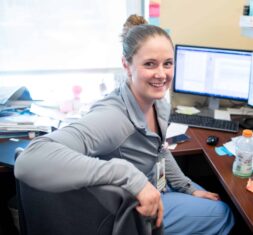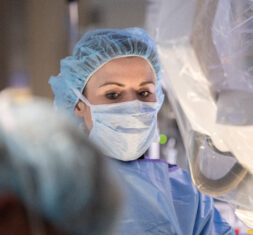What’s the difference between a physician assistant vs doctor when it comes to treating your back or neck pain? Is it better to see a physician assistant or a doctor? What can a physician assistant do to help diagnose and treat your lower back pain or your neck pain?
As a certified physician assistant (PA-C) at Neurosurgery One, I hear these questions frequently and I’d like to help clarify the issue and hopefully help reduce any anxiety you have around this topic.
Back and neck pain will arise for most adults at some point during our lives. The pain can interrupt nearly every aspect of daily living. I saw this firsthand when I was a teenager as my dad suffered from neck pain. He underwent surgery on his spine, and I witnessed his experience with neck pain providers every step of the way. This inspired me to become a physician assistant as I’m fascinated with science and love connecting with people. Ultimately, this led to my joining Neurosurgery One in 2017 as a surgical PA and now in the clinical setting where I work with patients throughout their back or neck pain journey, from an initial exam through surgery and recovery.
At Neurosurgery One, physician assistants are also called APPs. No, we’re not “apps” as in the app on your phone. An APP in the medical setting stands for advanced practice provider. APPs at Neurosurgery One include physician assistants as well as certified nurse practitioners.
Physician assistants are highly qualified medical providers and are able to prescribe medications, order and analyze imaging, create treatment plans, and ensure patients are on the fastest, medically-sound path to diagnosing and treating their back pain. Here are 5 top benefits a physician assistant or nurse practitioner provides for back pain patients at Neurosurgery One:
- Same-week Appointments: If you’ve tried to make a doctor’s appointment in the past several years, I’m sure you’ve noticed that there are often long wait times. As Neurosurgery One, our interventional pain management doctors and neurosurgeons may not have an appointment open for weeks. That’s because as neurosurgeons, they spend most of their time performing surgery and are only in center for new patient appointments 1-2 days a week. In contrast, our APPs often can see patients within 3-5 days of calling, sometimes sooner. Getting an appointment sooner than later ensures that you are on the fastest path to diagnosing and treating your symptoms.
- Direct Link to Physicians: All APPs at Neurosurgery One are in near constant contact with our physiatrists or neurosurgeons. We consult with our physicians on many patients, especially when their
 condition is more complicated or severe. This ensures that you will always receive top-notch care.
condition is more complicated or severe. This ensures that you will always receive top-notch care. - Immediate Plan of Action: As an APP, when I first see a patient, I can start making recommendations from day one. That might include ordering imaging, prescribing medication, getting a patient started with physical therapy, outlining lifestyle changes, or recommending other treatment options. I often have patients say, “I just want to feel like I’m doing something and moving forward.” By seeing an APP for your back pain, you can start moving forward the day of your first appointment. Regardless of whether you see me, another APP, or one of our physiatrists or spine surgeons, at your first appointment, most often you’ll need imaging and conservative therapies if you haven’t had either yet. That means if you wait to see a physiatrist or spine surgeon, you’ll be weeks behind where you might be if you see an APP initially. Simply put, seeing an APP first can get you feeling better sooner!
- Consistency of Care: APPs walk every step of the back pain journey with a patient. You’ll see me, or another APP at Neurosurgery One, at your initial appointment and then for every appointment thereafter. This may include surgical pre and post appointments and throughout your hospital stay if back surgery is recommended. I get to know you – your goals, your personality, and your medical conditions. This consistency of care ensures you have the most personalized care and better outcomes.
- Quality of Care: As an APP, I am an extension of your physician who can take time to listen to your concerns and answer questions. Our APPs at the Neurosurgery One Spine Center consistently have high patient satisfaction ratings, which is in large part due to the relationships we build with patients throughout their entire back pain journey. This survey of surgeons found that APPs decrease surgeons’ workload, improve patient safety, improve continuity of care, and lead to reduced hospital stays for surgical patients.
Can a physician assistant treat my back pain?
A PA, or physician assistant, can help diagnose and treat your back pain or neck pain. Whether it’s myself, or another PA or certified nurse practitioner in the Neurosurgery One Spine Center, we are involved in every step of your back pain treatment experience.
A PA/NP can do the following for your back pain:
- Conduct a physical exam
- Order and review imaging
- Prescribe medication
- Recommend injections (diagnostic and therapeutic)
- Prescribe physical therapy and other conservative treatments like massage and acupuncture
- Recommend lifestyle changes
- Evaluate your treatment plan and make modifications
- Recommend surgery
- Work in conjunction with a neurosurgeon to provide comprehensive spine care
- Provide pre and post-surgical education and care
As an APP at Neurosurgery One, I’m in direct contact with our team of spine surgeons and consult on many spine patients I see. This allows me to flag any concerns, get feedback on the proposed treatment plan, and streamline patient care.
Can a PA prescribe medication?
This is a question I get often, and absolutely, yes, a certified PA can prescribe medication. One of the biggest misconceptions about a PA is that we are an assistant, rather than a trained healthcare provider. It doesn’t help that “assistant” is in our title, and that we work alongside medical assistants. All PA-Cs (certified physician assistants) undergo extensive education (often 6-8 years), complete hundreds of hours of hands-on training and experience in the healthcare field, pass a certification exam, and maintain certification with ongoing medical education and recertification exams. You can find out more about the requirements of becoming a PA-C from the American Academy of Physician Associates (note that the industry is moving away from the term physician assistant and utilizing physician associate to better reflect our capabilities).
When and why to call a physician assistant for your back pain

If you have experienced back pain or neck pain for more than a few days and your symptoms are not improving with home care, you should communicate with your physician or primary care provider to rule out any red flags of back pain and start conservative treatment if appropriate. If your back pain persists for more than 6 weeks, if it is severe, or if it involves neurologic symptoms like numbness, weakness, or extremity pain, it might be time to consider seeing a physician assistant who specializes in back pain, like our team at the Neurosurgery One Spine Center. We can get you on the safest, quickest, medically-proven path to pain relief, and can often see patients within 3-5 days of your initial contact, sometimes sooner. If you need to be referred to an interventional pain management physician or a spine surgeon, a PA can order any advanced imaging and prescribe medications or treatment to ensure everything is in order to prepare you for your appointment (and streamline your care).
What’s the difference between a PA-C vs. a nurse practitioner?
At the Neurosurgery One Spine Center, our advanced practice provider (APP) team consists of both PA-C (physician assistant-certified) and certified nurse practitioners (CNP). PA-Cs and nurse practitioners are both extensively trained and have advanced degrees. In general, PA-Cs and nurse practitioners have nearly identical scopes of work and responsibilities. At the Neurosurgery One Spine Center, our team of APPs all focus on exceptional patient care and education.


